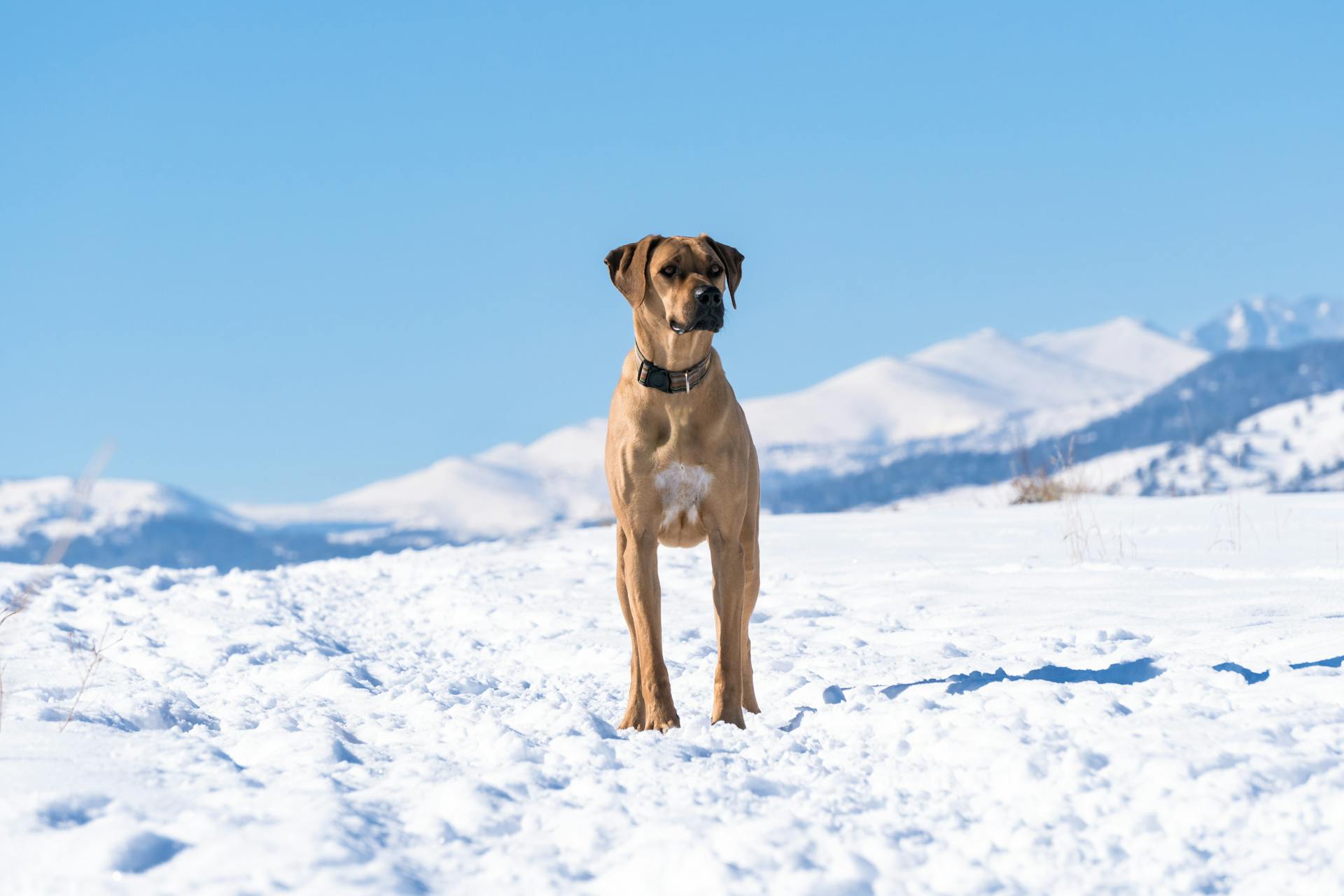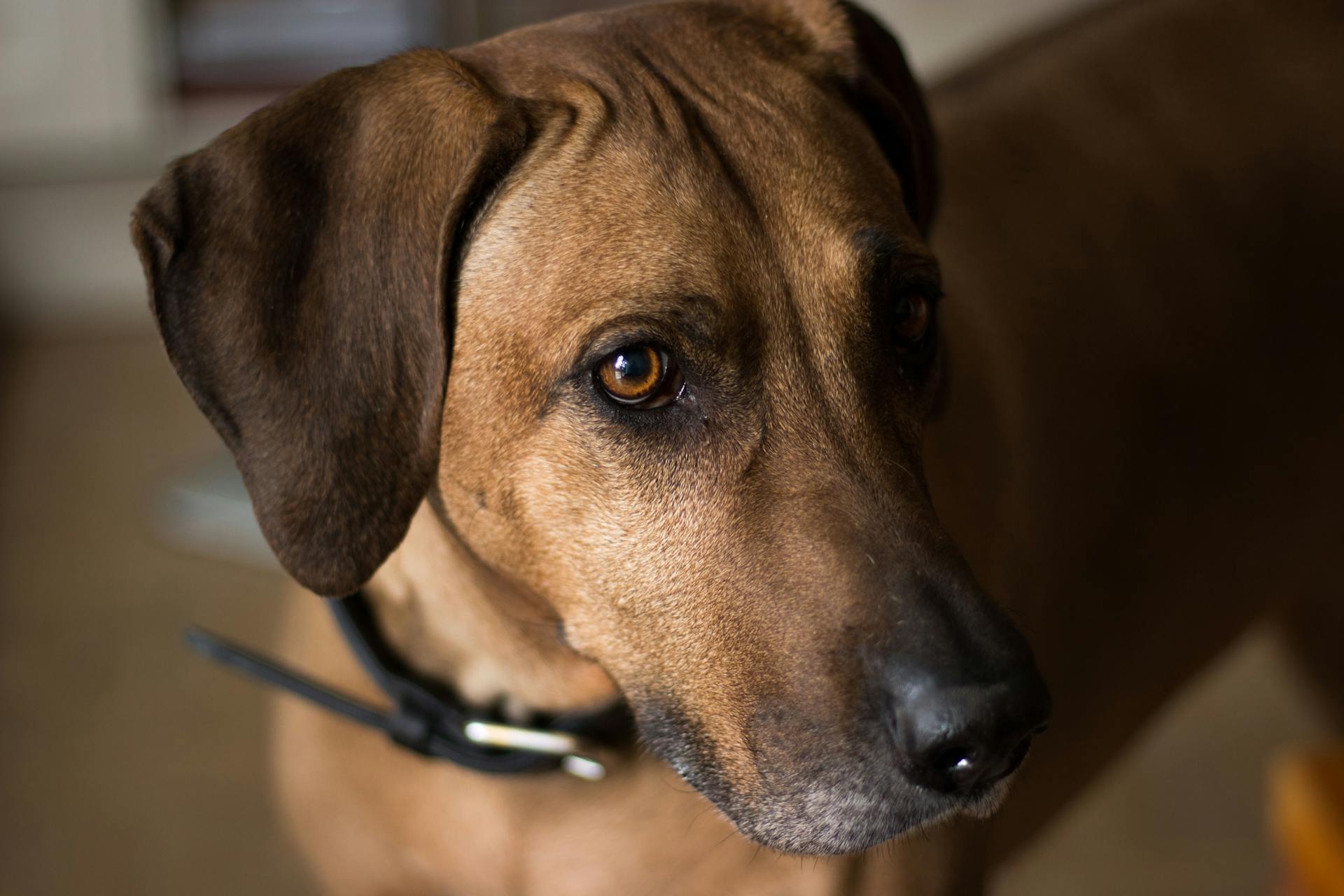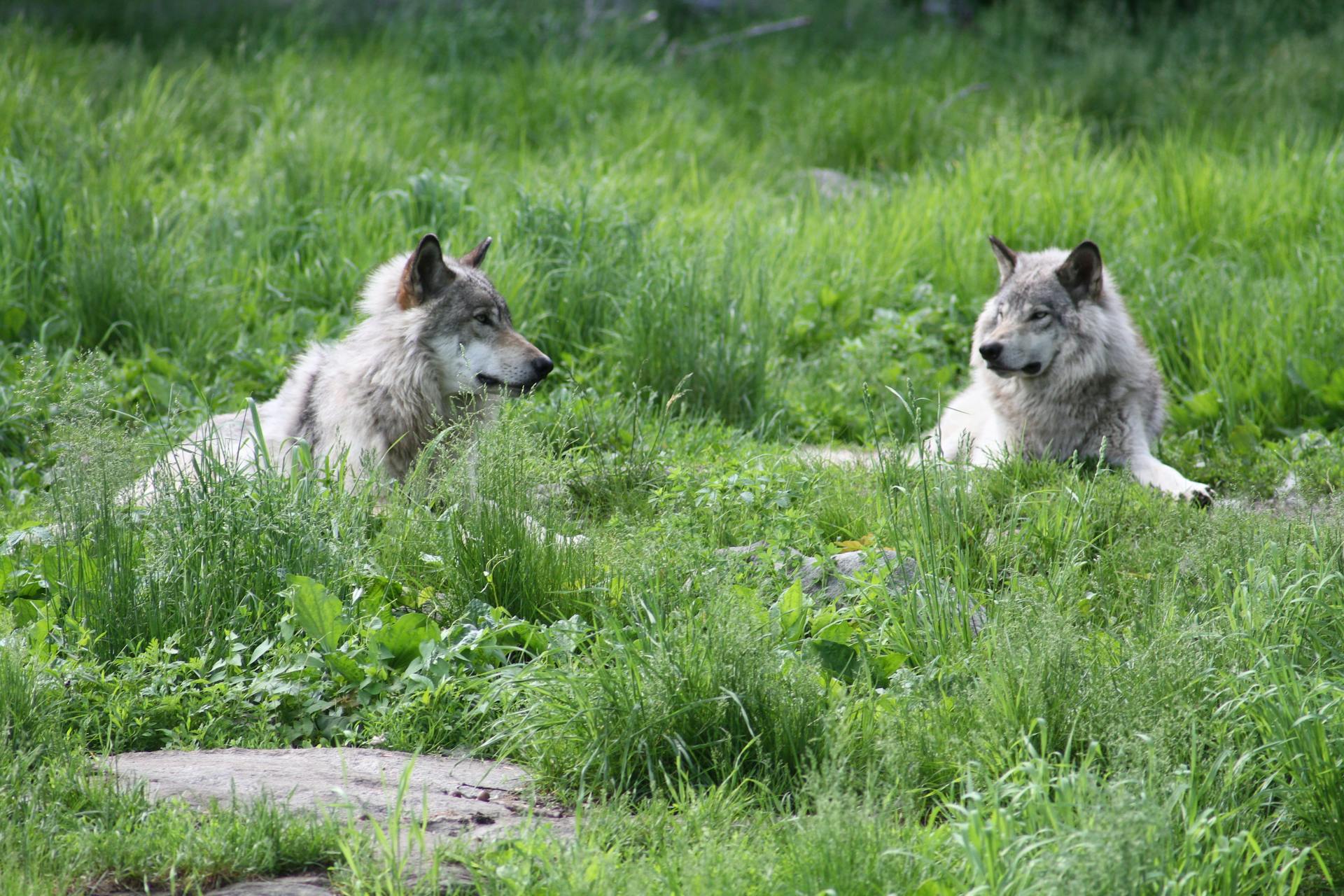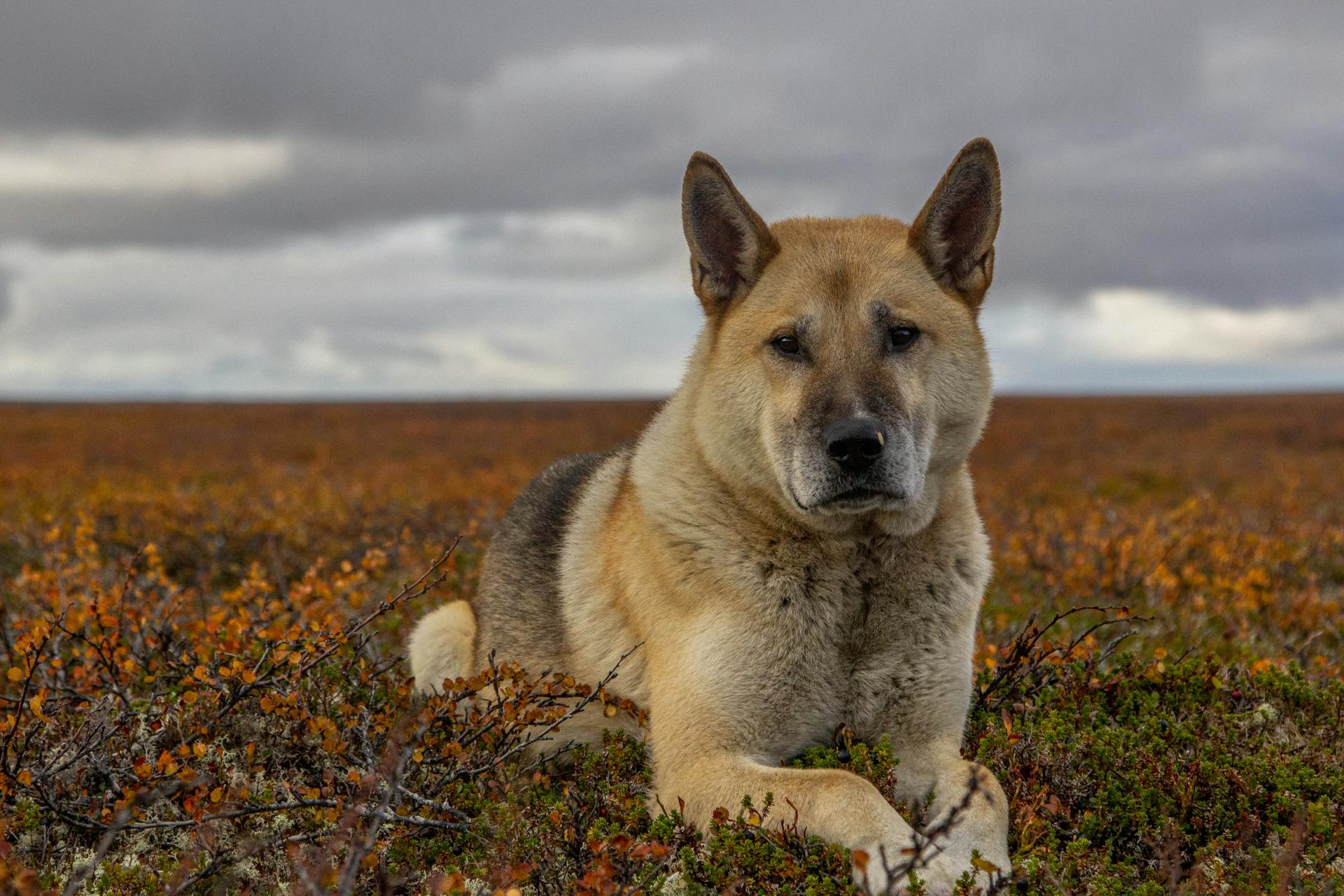
Ridgeback dogs are generally a safe breed to own, but as with any dog, they do require proper care and attention.
They are a relatively healthy breed, with an average lifespan of 10-12 years, thanks to their robust build and low maintenance needs.
However, they do have a higher risk of certain health issues, such as hip dysplasia and eye problems, which can be costly to treat.
With regular exercise and veterinary check-ups, many Ridgeback owners have reported a long and happy life with their furry friends.
Understanding Ridgeback Temperament
Rhodesian Ridgebacks are generally known for their loyalty, intelligence, and independence. They're confident dogs with a strong protective instinct towards their families.
Their temperament reflects their history as fearless hunters and protectors. Originally bred in southern Africa for hunting and guarding purposes, this breed has a natural instinct to defend what's theirs.
They're not typically aggressive towards humans or other animals without a valid reason. However, their protective nature can sometimes be misconstrued as aggression.
Their protective behavior is usually reserved for situations where they perceive a threat or danger to themselves or their loved ones. This is a crucial aspect to consider when addressing concerns about aggression in Rhodesian Ridgebacks.
Check this out: How to Stop Dog Aggression towards Other Dogs
Training and Socialization
Training and socialization are crucial for managing aggression in Rhodesian Ridgebacks. Proper training techniques include socialization, obedience training, desensitization, and counterconditioning.
Socialization is vital for Rhodesian Ridgebacks, especially when started early. Introduce your Ridgeback to different people, animals, and environments to help them develop confidence and reduce the likelihood of fear or aggression. A gradual exposure to new stimuli is essential, and positive experiences should be rewarding for your Ridgeback.
To ensure your Ridgeback gets along with other pets, consider the following:
- Ridgebacks can get along with other dogs, but they may be selective and have a high prey drive.
- They should never be allowed to interact with small pets like birds, rodents, or reptiles.
Consistent training and socialization can help control your Ridgeback's predatory instinct and reduce the likelihood of aggression. Be prepared to invest time and effort into training your Ridgeback, and remember that they require owners who are strong-willed and can provide clear boundaries and expectations.
How to Properly Socialize a Dog
Proper socialization is key to shaping a dog's behavior and reducing the likelihood of aggression. It's essential to start socializing your dog as early as possible, ideally when they're a puppy.
Early experiences will help your dog become comfortable with various people, animals, sounds, and environments. This is especially true for breeds like the Rhodesian Ridgeback, which can be aloof around strangers.
To ensure all socialization experiences are positive and rewarding for your dog, use treats, praise, and play to create positive associations with new experiences, people, and animals. Gradual exposure to new stimuli is also crucial, as overwhelming your dog with too many new experiences at once can lead to fear or anxiety.
Here are some tips for socializing your dog effectively:
Remember, socialization is an ongoing process that requires patience and consistency. By following these tips and starting early, you can help your dog become a confident and well-adjusted companion.
Does This Breed Get Along with Other Pets?
Ridgebacks can be selective with other dogs, bred to hunt and defend, so they may be suspicious of new dogs.
They have a high prey drive and may chase smaller dogs and cats.
Ridgebacks should never be allowed to interact with small pets like birds, rodents, or reptiles.
Preventing Issues
Choosing a reputable breeder is crucial in reducing the likelihood of aggression in Rhodesian Ridgebacks. They prioritize producing well-rounded and balanced dogs.
Early training and socialization are essential for creating a well-behaved and balanced dog. Consistency and positive reinforcement are key to building a strong bond between you and your Ridgeback.
A lack of proper training and socialization can contribute to aggression in Ridgebacks. This can lead to fear or anxiety, which can manifest as aggression. Neglect, abuse, or traumatic experiences can also contribute to aggressive behavior.
To prevent aggression, focus on positive reinforcement techniques, such as treats, praise, and play, to reward desired behaviors. Consistency is also vital in maintaining a structured environment where your dog knows what is expected of them.
Here are some early signs of aggression in Ridgebacks:
- Avoiding eye contact, looking away, turning the head or body away
- Yawning
- Lip licking
- Ears pinned back against the head
- Lowering the body to the floor or crouching, tucking the tail under the legs
- Freezing or stiffening
- Vocalizing or growling
- Snapping
- Biting or lunging
Factors Contributing
Lack of proper training and socialization can be a significant contributor to aggression in Rhodesian Ridgebacks. Without early exposure to various people, animals, and environments, Ridgebacks may develop fear or anxiety, which can manifest as aggression.

Neglect, abuse, or traumatic experiences can also contribute to aggressive behavior in Rhodesian Ridgebacks. Dogs that have experienced mistreatment or trauma may develop fear-based aggression as a defense mechanism.
Proper training and socialization are crucial to help Rhodesian Ridgebacks become well-rounded and confident dogs. This can be achieved by exposing them to positive experiences from an early age.
A safe and loving environment is essential in preventing aggressive behavior in Rhodesian Ridgebacks.
Preventing Issues
Choosing a reputable breeder is crucial in preventing aggression in Rhodesian Ridgebacks. A responsible breeder prioritizes producing well-rounded and balanced dogs.
Early socialization is essential in preventing aggression. Introduce your puppy to different places, sounds, experiences, and people to help them become confident and well-adjusted.
A lack of proper training and socialization can lead to aggression. Without early exposure to various people, animals, and environments, Ridgebacks may develop fear or anxiety.
Consistency is key in preventing aggression. Maintain a consistent routine and set clear expectations for your Ridgeback to prevent confusion and anxiety.

Positive reinforcement techniques, such as treats, praise, and play, can help prevent aggression. By rewarding desired behaviors, you can build a strong bond with your Ridgeback.
Here are some signs of aggression in Rhodesian Ridgebacks to look out for:
- Growling and snarling
- Biting and snapping
- Stiff body language
- Guarding behavior
By being aware of these signs and taking steps to prevent aggression, you can help your Rhodesian Ridgeback live a happy and healthy life.
Aggression and Help
Aggression in Rhodesian Ridgebacks can be a serious issue, and it's essential to recognize the signs early on. If you notice any aggressive behavior in your Ridgeback, such as growling, snapping, or biting, seek help from a qualified dog trainer or behaviorist.
In some cases, aggression in Rhodesian Ridgebacks may persist or escalate despite your best efforts. It's crucial to address the issue promptly to prevent potential harm to both you and your dog.
Attempting to handle severe aggression issues on your own can be potentially dangerous, so it's best to seek professional help. A qualified dog trainer or behaviorist can assess the underlying causes of the aggression and provide tailored guidance and training techniques.
Worth a look: Best Dog Food for Malnourished Dogs
Conclusion and Ownership
Rhodesian Ridgebacks are not naturally aggressive, but their behavior is shaped by factors like genetics, training, and environment.
With the right upbringing, training, and socialization, they can be loving and loyal family pets.
To prevent or manage aggression in Rhodesian Ridgebacks, understanding their temperament and addressing common misconceptions is crucial.
Implementing proper training and socialization techniques can help them thrive as companions.
Providing a loving and structured environment is key to helping your Ridgeback become a well-rounded and balanced companion.
By focusing on training and socialization, you can enjoy a wonderful and fulfilling relationship with your Ridgeback.
Breed Information
Ridgebacks were bred to hunt ferocious African big game and defend camps from threats, so they can be a little suspicious of new dogs.
They have a high prey drive and may chase smaller dogs and cats, which is something to consider if you have multiple pets in the household.
Ridgebacks should never be allowed to interact with small pets like birds, rodents, or reptiles, as their instincts may take over and cause harm.
Pros of Ownership
Rhodesian Ridgebacks make excellent companions due to their loyal nature. They're known to form strong bonds with their owners.
One of the standout features of this breed is their exceptional intelligence. This means they're highly trainable and can pick up commands quickly.
Rhodesian Ridgebacks are also natural guard dogs, thanks to their protective instincts. This doesn't mean they're aggressive, but rather, they'll defend their family and territory when necessary.
They're a great choice for families with children, as they're patient and gentle. This makes them an excellent addition to households with little ones.
Their unique appearance, featuring a distinctive ridge of hair running down their back, sets them apart from other breeds. This is just one of the many characteristics that make Rhodesian Ridgebacks stand out.
Rhodesian Ridgebacks are generally quiet and calm in the home, making them a great choice for those who value a peaceful living environment.
Origin & History
The Rhodesian Ridgeback originated from the native Khoikhoi dog and European breeds brought by colonists in the 17th century. This combination gave the breed the resilience to tackle formidable native beasts and work in the challenging African environment.
The breed's ancestors were originally known as African Lion Hounds, a fitting name given their bravery in the face of lions and other African wildlife. They were also known for their speed and agility, making them a valuable asset in hunting.
In the 19th century, Cornelius van Rooyen, a big-game hunter, included two female Greyhound-like dogs in his pack, leading to a litter of brave dogs that worked well alongside horses. This breeding laid the foundation for the modern Rhodesian Ridgeback.
The breed didn't have a standardized description until 1922, when big-game hunting was losing popularity in Africa. This lack of standardization meant that the dogs that fit the Rhodesian Ridgeback description were diverse, ranging from small and stocky to tall and lean.
The breed's signature feature, which gives it its name, is the distinctive ridge of forward-growing hair on its back.
If this caught your attention, see: Dog Treats for Big Dogs
Were Bred?
Rhodesian Ridgebacks were originally bred from the Khoikoi hunting dogs in the area for decades.

These incredible sporting dogs were honed into the perfect companions for hunting and baying lions.
They were not bred to kill, only to find and bait the lions.
Aggression was not a desirable trait and was never bred into them.
Rhodesian Ridgebacks were used as protectors in these hunts, but their primary purpose was to find and bait lions, not to harm them.
They retain the courage, stature, and backward stripe of hair that their forbears did.
They make great pets for active households who want a clever and affectionate protector.
Their owners need to provide them with training and lots of exercise to keep them from becoming bored and destructive.
With proper care and attention, Rhodesian Ridgebacks can thrive as loving and devoted companions.
Training and Behavior
Training a Rhodesian Ridgeback requires patience, consistency, and positive reinforcement. Proper training is essential for managing aggression in these dogs.
Socialization is key, starting from an early age, to help them develop confidence and reduce the likelihood of fear or aggression. Gradually expose them to different people, animals, and environments.
Obedience training is crucial, teaching basic commands like sit, stay, come, and leave it. This helps establish you as the leader and provides clear boundaries and expectations.
Desensitization and counterconditioning techniques can be effective in managing aggression towards specific triggers. Gradually expose your dog to the trigger in a controlled and positive way, rewarding calm and non-aggressive behavior.
Proper leash training is vital for managing aggression during walks. Teach your Ridgeback to walk calmly on a leash, using positive reinforcement to reward good behavior.
To ensure your Rhodesian Ridgeback doesn't become fearful or show fear aggression, socialization is essential. Introduce them to lots of people and different experiences, including interaction or sight of other animals.
Rhodesian Ridgebacks have a natural predatory instinct, which can lead to behaviors like chasing wild animals or neighbors' cats. Early introduction to other animals can help control this instinct.
Consistent training and setting clear boundaries are crucial, as Rhodesian Ridgebacks can be strong-willed and may think they're equal to their owners. Fail to display strong leadership, and they may rule the roost.
For your interest: Dog Names for Strong Dogs
Here are some key training areas to focus on with your Rhodesian Ridgeback:
- Socialization: Introduce them to lots of people, animals, and environments.
- Predatory Instinct: Control this instinct with early introduction to other animals.
- Obedience Training: Teach basic commands and establish clear boundaries.
- Desensitization and Counterconditioning: Manage aggression towards specific triggers.
- Leash Training: Teach your Ridgeback to walk calmly on a leash.
Getting a Ridgeback
You have two good options when it comes to getting a Rhodesian Ridgeback: buying from a breeder or adoption/rescue.
Choosing a breeder carefully is crucial, so research them thoroughly and spend time with the mother of the pups, ideally both parents, to see their temperament and health.
You should also be aware that buying from a reputable breeder can be expensive, but it's worth it to avoid potential negative traits.
Rescuing or adopting an older dog can be a great option, as they've already developed their temperament and may have had training.
However, be aware that older dogs may have existing issues that can be harder to address than in younger dogs or puppies.
Researching the breeder and seeing the parents can help you avoid buying puppies with potential negative traits.
Rescuing or adopting can be a rewarding experience, but it's essential to consider the potential issues an older dog may have.
Getting a puppy from a reputable breeder can be a great option, but it's not the only way to bring a Rhodesian Ridgeback into your family.
Broaden your view: Personality Traits of Husky Dogs
Frequently Asked Questions
Do Rhodesian Ridgebacks bite?
Rhodesian Ridgebacks are known to be strong biters, especially during the puppy stage, and may also exhibit rough play behavior like body slamming. If you're considering bringing one home, it's essential to learn about their unique needs and training requirements to ensure a harmonious household.
Are ridgebacks tough dogs?
Yes, Rhodesian ridgebacks are known for being tougher than typical hound breeds. Their robust nature makes them a great choice for active families and outdoor enthusiasts.
Sources
- https://blog.tryfi.com/ridgeback-aggression-myths/
- https://www.dogster.com/dog-breeds/are-rhodesian-ridgebacks-aggressive
- https://www.mirror.co.uk/news/world-news/10-dog-breeds-too-dangerous-7933148
- https://www.thepetsandlove.com/are-rhodesian-ridgebacks-dangerous/
- https://www.dogster.com/dog-breeds/rhodesian-ridgeback
Featured Images: pexels.com


